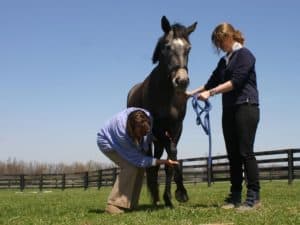Antimicrobials and Antimicrobial Resistance
When a prescribed medication doesn’t work as it should, one cause could be antimicrobial (antibiotic) resistance. Is the widespread use of antibiotics selecting for stronger and stronger pathogens that can resist the drugs we use to fight them? This was discussed at the Antimicrobials and Antimicrobial Resistance Table Topic, moderated by Josie Traub-Dargatz, DVM, MS, Dipl. ACVIM, professor o
- Topics: Article
When a prescribed medication doesn’t work as it should, one cause could be antimicrobial (antibiotic) resistance. Is the widespread use of antibiotics selecting for stronger and stronger pathogens that can resist the drugs we use to fight them? This was discussed at the Antimicrobials and Antimicrobial Resistance Table Topic, moderated by Josie Traub-Dargatz, DVM, MS, Dipl. ACVIM, professor of equine medicine at Colorado State University’s Veterinary Teaching Hospital and Biomedical Sciences Department in Fort Collins, Colo.; and Scott Weese, DVM, DVSc, Dipl. ACVIM, a microbiology specialist at the University of Guelph in Ontario, Canada. Traub has worked on the American Veterinary Medical Associations’ (AVMA) committee on antimicrobial resistance as a representative of the American Association of Equine Practitioners (AAEP).
The AAEP has developed guidelines for the judicious use of antimicrobials in an attempt to clarify for the membership the principles of judicious or prudent use of antimicrobials with a goal of keeping the drugs used to treat bacterial infection effective in resolving disease. In the guidelines, it was made clear that AAEP members get regular education on antimicrobial use and work with horse owners to implement methods to prevent disease through vaccination and biosecurity/hygiene methods
Create a free account with TheHorse.com to view this content.
TheHorse.com is home to thousands of free articles about horse health care. In order to access some of our exclusive free content, you must be signed into TheHorse.com.
Start your free account today!
Already have an account?
and continue reading.
Written by:
Sarah Evers Conrad
Related Articles
Stay on top of the most recent Horse Health news with












